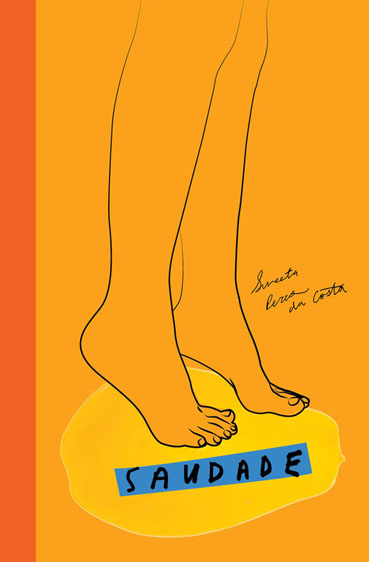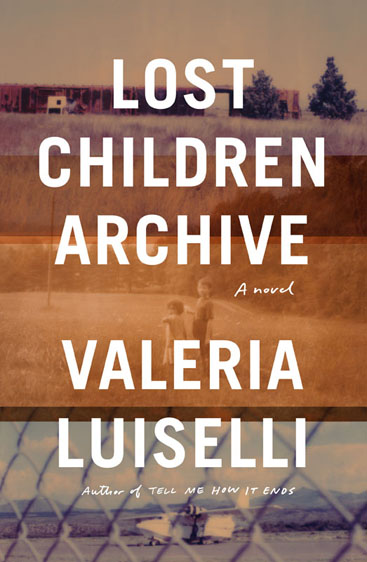Ratik Asokan: Both these novels are set against backdrops of political upheaval. Valeria Luiselli’s Lost Children Archive unfolds in the early months of 2014’s border crisis, when news reports about an uptick in unaccompanied minors from Central America arriving at the southern border grabbed national attention. Suneeta Peres da Costa’s Saudade is about a young girl, an immigrant from Goa, India, growing up in 1960s Angola, as the Portuguese colonial government crumbles, and the revolutionaries in the MPLA make a bid to take over. Yet they are not incident-packed books. Lost Children Archive is the story of a family—father, mother, two young children—who are on a road trip from New York to Arizona, listening to news of the crisis as it breaks on the radio. In Saudade, the story’s heroine belongs to a middle-class family that is largely insulated from state and revolutionary violence.
It is this contrast—between the shocking, harsh backdrop and the more mundane, everyday lives of the characters—that gives these novels their tension and ethical stakes. Broadly, both books can be described as works of witness. What does it mean to live in safety in the knowledge that other members of your society are suffering unspeakable injustice? This is the question they set out to answer.
The books’ methods are very different. Lost Children Archive is the roving, ambitious novel, spanning different narrative registers—essay, diary, report, story—and involving multiple narrators, not to mention a library of allusions. The novel also stages the ethical drama more self-consciously. “The lost children’s stories are troubling our own children,” the narrator remarks early into the road trip. “We decide to stop listening to the news, at least when they are awake. We decide to listen, instead, to music.” From this point on, as in Deborah Eisenberg’s long story “Under the 82nd Airborne,” we observe the family slowly come out of its liberal cocoon as it is transformed by the distant news. (In the novel’s final section, the two children stage their own disappearance to win back the family’s attention.)
Saudade is more straightforward. The book plays out entirely in the first person, with an unnamed narrator—her present age remains unclear—looking back at her fraught past. That said, the situation the novel tackles is morally more complex. The girl at the heart of the story grows up with maids, drivers, and the other trappings of a colonial middle-class lifestyle, which implicates her in the subjugation of the native population, if only by association. (This situation—of ruefully, helplessly looking back on the sins of your family—was previously taken up by Turgenev in A Sportsman’s Sketches.) For example, her father is a labor lawyer who services the elite:
I was too young to have understood the liabilities he dealt with were human: that the men and women against whose sicknesses and accidents he insured Portuguese and other European pastoralists were native contract laborers. It did not occur to me then that, to protect the interests of the owner of an iron-ore mine against his laborers’ lung disease, tuberculosis, and cataracts, a person may become blind after his own fashion.
For all their formal differences, the books share a broadly liberal ideological framework. Politics is presented as a rude interruption—usually in the form of news—into the otherwise placid lives of characters, rather than as a joint project that we are all shaped by and contribute to. This is perhaps why these books seem to have a kind of split personality. We shuttle between the individual stories, which are graceful and compelling enough, and the larger political narrative, without grasping how the two are related. By contrast, in more radical political fiction—J.M. Coetzee’s Waiting for the Barbarians; Kazuo Ishiguro’s An Artist of the Floating World—we are shown how people’s very personality and innermost desires are shaped by political ideology, however drably uneventful their lives might be. To put it another way, where Saudade and Lost Children Archive understand politics as a backdrop or occurrence—the backward glance; the news story—in Waiting for the Barbarians and An Artist of the Floating World, it is always already there, like the air the characters breathe.
Lost Children Archive is the more accomplished, polished novel. Even if the prose is a little brisk and flat, the diaristic sections of the mother figure are enjoyable in an ambient autofiction way. Saudade feels more ragged and forced, as if it were grasping for a story rather than telling it. It also offers less on the intellectual level. Neither novel, it seems to me, truly reckon with what it means to be a witness, if only because they are unwilling, in the final analysis, to implicate their characters for the crimes committed in their name by the state—that is, in the name of the “American” and the “Angolan” citizen representatively. As citizens, we can speak out against state violence, but—alas—we are also stained by it. State violence is a shame that will outlive us, which is a bitter truth that Coetzee and Ishiguro understand so well.
What of the verdict? “The basic cultural value of a prize,” John Berger pointed out a long time ago, “depends upon what it is a stimulus to.” My sense is that this competition exposes interesting books to a wider readership, and stimulates useful public discussion in the process. I chose to advance Saudade because it is written by someone I believe to be a less-known writer, and is set in a country not often discussed in the United States (though America did meddle in its political affairs). If (like me) you are worried about the political direction the world is moving in, and are trying to understand how we got here, both books will give you something to think about.
From our match sponsor: Valeria Luiselli appears on this week’s episode of Bookin’ With Jason Jefferies. It’s a fascinating discussion about Lost Children Archive, soundscaping, COVID-19, road trip novels, parenting, Cormac McCarthy, American Dirt, and much more. Luiselli will be appearing at Quail Ridge Books on Oct. 27 (rescheduled from March 19), and signed copies can be preordered here (with FREE SHIPPING).
Match Commentary
By Maggie Schneider & Andrew Womack
Andrew Womack: Hi Maggie, and welcome to the booth! You’re another of this year’s Reader Judge finalists, and it’s great to have you here. Let’s get started with you telling everyone a bit about yourself.
Maggie Schneider: Thanks Andew. Greetings everyone, I’m Maggie! I’m a longtime fan of The Morning News and the Tournament of Books, contributing to both in an official capacity for the first time today. I’m an enthusiastic reader of all types of fiction, with a special affection for literary speculative work. Despite the many hours I spend on it, my fiction reading is entirely a joyful hobby. Professionally, I’m a psychiatrist and neuroscientist in the Boston area, where I’m also an assistant editor for the Harvard Review of Psychiatry. I’ve followed the Tournament for many years, and have encouraged friends to play along with such relentless enthusiasm that I have been called a ToB evangelist. I am absolutely delighted to have been plucked out of the Commentariat to be here.
Andrew: So I have to ask: What’s the psychiatry/neuroscience take on these two novels? Did you find anything in them especially true (or not!) in the way they approach how humans operate?
Maggie: What an interesting question. Sometimes I find that being a scientist can ruin a book for me; bad science makes it hard to suspend disbelief, and that can take me completely out of the story. For example, I expected to love The Book of Joan in the 2018 ToB, but the science was so absurd that I just felt frustrated the whole time I was reading it. This is a peril of being a scientist that loves speculative fiction. I am glad to report that there was nothing that striking in either of these books.
I tend to find my scientist-mind intruding in novels that deal specifically with memory, something that clearly does apply to both of these books. Thankfully, this came to me more in discussing them than as interruptions during the reading. I read Saudade most recently, and I think it did a lovely job of portraying how we form and recall episodic memories. This is evident structurally with the lack of paragraph breaks and use of ellipses, as memory is almost always less linear than we wish it to be. It also does a beautiful job aligning the content with what actual memories of early life are like: The earliest chapters are briefer flashes and not terribly bound to reality. Similarly, it includes more details, including more explicit mention of how the narrator was feeling physically, in the highly emotional moments: the day her brother was born dead, the memories of her relationship with Miguel. Overall, the book succeeds in creating a narrative that feels honest and realistic both to my scientist-brain’s knowledge of how memory works, and to my experience as a therapist listening to how people articulate and synthesize the narrative of their lives.
I read Lost Children Archive back in July for Camp ToB. I loved it then and I’ve since recommended it to a neurologist friend who is thinking about writing a novel about memory. (This is, I assure you, high praise.) The only thing that bothered me about it at the time was that Swift Feather had certain abilities that felt older than his theoretical 10 years. He was a little too articulate, a little too consciously understanding. In Saudade, we see some events that the narrator doesn’t understand at the time, but more in line with the way children experience such moments. For example, at the doctor with her mother: The narrator remembers the event because she realized something significant is happening, but she didn’t know what at the time, and she doesn’t superimpose the later interpretation on the memories. In contrast, in Lost Children Archive, Swift Feather felt to me, at times, a little too prescient and able to interpret complex events.
Andrew: Totally agreed. This was something that struck me during the Camp ToB reading of Lost Children Archive as well. As I recall, the book tells us that Swift Feather reads at an advanced age level, which I took as a way to explain his vocabulary. But I did wonder about the difference between precociousness in language versus a maturity in understanding the events happening around him. Then again, he didn’t have the maturity or foresight to be able to recognize that leaving the family with his sister in tow was a very bad idea. Is this a frontal lobe thing?
Maggie: Yes, emotional intelligence and foresight are both, in some ways, “frontal lobe things.” Our cortex basically develops back to front, and while most of the connections between different areas are present when we’re born, they don’t get efficient until they’re myelinated, and that happens during adolescence. That’s why children often have more difficulty understanding and regulating their emotions than adults, and why teenagers can be impulsive. It’s the inhibitory and regulatory processes that come online last in development. Swift Feather’s level of foresight felt just right to me actually. He’s responsible, so he brings things that make sense: a compass, his Swiss Army Knife, “lots of snacks,” and water. Yet, he’s a child, so he fails to even begin to understand the sheer vastness of the world he’s walking out into.
Equating language ability with emotional maturity is a very common “danger” in dealing with bright children. Precocious language development rarely correlates with precocious development in other areas, but adults often either mistake advanced language for emotional maturity, or sort of forget the age of a child that has a vocabulary beyond their years.I’m sure that many members of the Commentariat can remember being handed a book that while not technically too hard, had content that was way too mature. I think that Luiselli is guilty of this same kind of forgetting; even if she made a conscious decision to make Swift Feather linguistically advanced, she unconsciously also made him too emotionally advanced. I also think that Swift Feather and Memphis in part served as a reminder of what childhood should look like, as a sharp contrast to the children in the Elegies,and that the power of that contrast is lessened a little by Swift Feather being wise beyond his years.
While I did sometimes bump on Swift Feather seeming wise beyond his years, I do want to say that I found the second half of the novel a transporting and beautiful example of the magical-realist nature of childhood memories, especially childhood memories of difficult or traumatic experiences. Children use the tools they have to make sense of what happens to them. They are so much closer to magic than we are as adults, so they use it to explain things they don’t understand at the time. I don’t think we know the objective truth of what happened to Swift Feather and Memphis on their journey, but the version we got is both beautifully written and true to my experience and professional understanding of the narratives and memories of childhood.
My therapist-mind was also delighted to learn the word “saudade.” For those that didn’t look it up, it’s one of those delightful untranslatable words that means, “a feeling of longing, melancholy, or nostalgia that is supposedly characteristic of the Portuguese temperament.” Very often the goal of therapy is to help people to more completely identify, name, and experience their emotions, and I am fascinated by the role that language plays in this process. I sometimes use something called a “feelings wheel”—a diagram with the core emotions at the center and increasingly specific words in two outer rings. It can seem silly, but time and time again my patients have found it useful, and the moment of finding the “right” word for something can be both profoundly cathartic and help people to go deeper. Of course, my feelings wheel is limited to the emotions that we have words for in English. I suspect that it is less likely that saudade is “characteristic of the Portuguese temperament” than that Portuguese-speaking people can express this complicated emotion more fluidly because they have the good fortune of having the word. I collect untranslatable emotional words in a notebook, and sometimes share them with patients who seem to feel that English is failing them. I am glad to add “saudade” to my collection.
Andrew: Using the feelings wheel here, what were your feelings about these books?
Maggie: Ooh, making me use my own tools, I like it. Lost Children Archive felt enormous and important to me, in part because it created in me moments of feeling really powerless and inadequate in the face of the issues it explored. I was genuinely frightened for both Swift Feather and Memphis, and both enraged and terrified for the children in the Elegies. In contrast to our esteemed judge, I did feel that the politics was in the very air throughout the novel, I was completely engrossed but never comfortable.
While it’s not on the wheel, the word that comes to mind for how I felt reading Saudade is languid—lazy and a little bit unfocused. I read it in a single sitting, but not because it was propulsive, because I felt unrushed and not inclined to do anything else. I think that feeling comes in part from me absorbing a little of the narrator’s detachment from the politics that were happening in the background. I kept expecting the political to come to the forefront, and I was frustrated that it never really did. The book did make me curious, and I took time to read online about the history of Angola, but I think that was in part because there wasn’t enough of it in there. It felt to me like it could have been set in almost any tropical-ish colony at the start of independence. This distance from the politics made the novel feel almost aggressively apolitical, or maybe un-political, in sharp contrast to Lost Children Archive. I would have made a different judgement, but since Judge Asokan based the final verdict on perpetuating one of my favorite aspects of the Tournament, I can hardly complain.
Andrew: Excellent. Thank you so much, Maggie!
Tomorrow, the semifinals continue as Deena ElGenaidi decides between Optic Nerve and Trust Exercise. Kevin and John will be back in the booth.
New 2020 Tournament of Books merch is now available at the TMN Store. As a reminder, Sustaining Members receive 50 percent off everything in our store. To find out why we’re asking for your support and how you can become a Sustaining Member, please visit our Membership page. Thank you.
Welcome to the Commentariat
Population: You
To keep our comments section as inclusive as possible for the book-loving public, please follow the guidelines below. We reserve the right to delete inappropriate or abusive comments, such as ad hominem attacks. We ban users who repeatedly post inappropriate comments.
- Criticize ideas, not people. Divisiveness can be a result of debates over things we truly care about; err on the side of being generous. Let’s talk and debate and gnash our book-chewing teeth with love and respect for the Rooster community, judges, authors, commentators, and commenters alike.
- If you’re uninterested in a line of discussion from an individual user, you can privately block them within Disqus to hide their comments (though they’ll still see your posts).
- While it’s not required, you can use the Disqus
tag to hide book details that may spoil the reading experience for others, e.g., “ Dumbledore dies .” - We all feel passionately about fiction, but “you’re an idiot if you loved/hated this book that I hated/loved” isn't an argument—it’s just rude. Take a breath.




